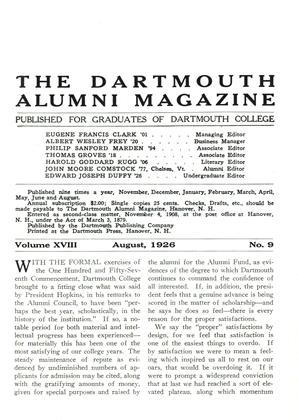One volume of the original diary written by John Ledyard, the most picturesque student in Dartmouth history, has been recently acquired by the Dartmouth College Library. Librarian N. L. Goodrich who saw the item listed in a catalogue issued by the Museum Book Store, London, cabled immediately to England and succeeded in purchasing the volume for the College. Several other requests for the diary were received by the Museum Book Store following Mr. Goodrich's cable.
This volume of John Ledyard's diary is neatly bound and legibly written on 161 pages. It came from the library of Henry Beaufoy, the friend and benefactor of Ledyard.
John Ledyard entered Dartmouth College as a charity student to train for Indian missionary service. His restless spirit was more interested however, in travel than in studies, and after four months in Hanover he built a canoe upon the bank of the Connecticut river and accompanied only by a volume of Ovid descended the river to the sea. Shipping as an ordinary seaman to England he joined Captain Cook's ship which circumnavigated the globe and was one of the two witnesses of Cook's death.
The manuscript which is now in the vault at the Library, tells of only a part of his travels. Following the failure of his scheme with John Paul Jones to open up the fur trade of Northwest America, Ledyard, always wanting to travel, set out on foot to cross the north of Europe to the east of Asia as a preliminary to his walk through America.
Without money, except for a few pounds given to him, he landed in Hamburg, went through Denmark to Stockholm and found that he could not cross the gulf of Bothnia. In the dead of winter, he set out and crossed the gulf, a distance of 1,500 miles, in seven weeks. In this tr'emendous undertaking, he walked an average of thirty miles a day and arrived in St. Petersburg in March, 1787.
The manuscript opens here in Russia with Ledyard's stay in Yakutsk. Here he came across a certain Captain Billings who turned out to be a criminal of the worst type. Billings and his troop burned a church and from it stole jewels and images valued at 30,000 rubles.
Ledyard has made a careful account, through, his manuscript, of the customs of the people, of their marriage ceremonies, and their stature. These accounts of the traditions seem to be Ledyard's only recreation while waiting to cross to Okotsk.
It was at this time that the American traveler was thrown into prison by Queen Catherine of Russia. The exact cause of his imprisonment and maltreatment is not known, but is is believed that Ledyard was suspected to be spying" upon the newlyformed Russian-American Company.
Concerning the maltreatment he received at the hands of the Russians, Ledyard writes: "Detained in every town I pass through by one idle rascal or another and the snuff-box sergeant that guards me more now than any other—'take Physic pomp'—loose your liberty for one hour, ye who never lost it, that ye may feel what I feel."
Later on in the journal with an entry under March 12, he states that he is on the road to Poland and 220 versts from Moscow. "I am in the city of TsTeesha, in the vile, dark, dirty, gloomy camp room; it is called quarters, but it is a miserable prison. ... I was very ill yesterday. I am emaciated. It is more than 20 days since I ate and in that time, I have been dragged in some miserable open Kabitka 5,000 versts."
Ledyard's trip across the continent was impossible as he was conducted out of Russia by the government to Poland. From here he set out to Africa to explore that continent from the Nile to the Niger. Ledyard died at Cairo from a dose of vitriol which he had taken as a cure for biliousness. He was but thirty-eight years of age, had done more in his life than most men, and in his last letter to the African Association was his wish that they might all say to him, "Well done."
 View Full Issue
View Full Issue
More From This Issue
-
 Article
ArticleDARTMOUTH COLLEGE MEMORIAL FIELD FUND CONTRIBUTORS BY CLASSES
August 1926 -
 Article
ArticleTHE ONE HUNDRED AND FIFTY-SEVENTH COMMENCEMENT
August 1926 -
 Article
ArticleWITH THE FORMAL
August 1926 -
 Class Notes
Class NotesClass of 1916
August 1926 By Jesse K. penno -
 Article
ArticleJUNE MEETING OF THE ALUMNI COUNCIL
August 1926 -
 Sports
SportsTHE DISTRIBUTION OF FOOTBALL TICKETS
August 1926 By James A. Hamilton '22
Article
-
 Article
ArticleDR. HOPKINS MAKES TWO SPEAKING TRIPS
March 1925 -
 Article
ArticleCOLLEGE ENROLLMENT STILL EXCEEDS DESIRED LIMITS
NOVEMBER 1927 -
 Article
ArticleGiven Distinguished Poetry Post
APRIL 1959 -
 Article
ArticleThe Undergraduate Chair
December 1956 By DON MCCUAIG '54 -
 Article
ArticleScience and General Education
May 1947 By ROY P. FORSTER -
 Article
ArticleThayer School
April 1943 By William P. Kimball '29

